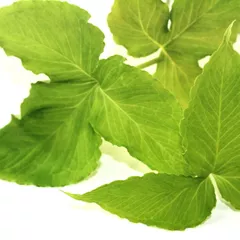
Dai Zhe Shi
Dai Zhe Shi
English: Hematite
Chinese: 代赭石
Parts used: The mineral
TCM category: Herbs that anchor and calm the Spirit
TCM nature: Cold
TCM taste(s): Bitter
Organ affinity: Stomach Heart Liver Pericardium
Scientific name: Iron oxide
Other names: Haematite, Red ochre
Use of Dai Zhe Shi (hematite) in TCM
Please note that you should never self-prescribe TCM ingredients. A TCM ingredient is almost never eaten on its own but as part of a formula containing several ingredients that act together. Please consult a professional TCM practitioner, they will be best able to guide you.
Preparation: Take the original mineral, remove impurities, smash into pieces or crush into powder. Cook for 2 hours before adding other herbs to any formula that contains hematite.
Dosage: 9 - 30 grams
Main actions according to TCM*: Calms the Liver, anchors uprising Yang and clears Liver Fire. Moves Qi downward. Cools the Blood, stops bleeding.
Primary conditions or symptoms for which Dai Zhe Shi may be prescribed by TCM doctors*: Irritability Dizziness Vertigo Tinnitus Blurred vision Asthma Vomiting Nosebleed Abnormal uterine bleeding
Contraindications*: Do not use during pregnancy. Because it most likely contains traces of arsenic, it should only be used for short periods.
Common TCM formulas in which Dai Zhe Shi is used*
Xuan Fu Dai Zhe Tang
Source date: 220 AD
Number of ingredients: 7 herbs
Formula key actions: Regulates the downward flow of Stomach Qi. Expectorant, treats hiccups.
Conditions targeted*: HiccupsChronic gastritis and others
Dai Zhe Shi is a deputy ingredient in Xuan Fu Dai Zhe Tang. This means it helps the king ingredient(s) treat the main pattern or it serves to treat a coexisting pattern.
In Xuan Fu Dai Zhe Tang, Dai Zhe Shi has a sinking nature and strongly suppresses Rebellious Qi.
Strengthening the downward-directing rather than the Phlegm-transforming action of Inula flower (Xuan Fu Hua) is a reflection of the fact that the primary focus of this formula is on subduing Rebellious Qi in order to control the symptoms of belching, hiccup, and vomiting.
Zhen Gan Xi Feng Tang
Source date: 1918 AD
Number of ingredients: 12 herbs
Formula key actions: Sedates the Liver. Axtinguishes Wind. Nourishes the Yin. Anchors the yang.
Conditions targeted*: HypertensionRenal hypertension and others
Dai Zhe Shi is a deputy ingredient in Zhen Gan Xi Feng Tang. This means it helps the king ingredient(s) treat the main pattern or it serves to treat a coexisting pattern.
In Zhen Gan Xi Feng Tang, Dai Zhe Shi has a heavy nature that enables it to direct the Qi downward and control its rebelliousness. It calms the Liver, anchors the Yang, directs the Stomach Qi downward, and pacifies Rebellious Qi in the Penetrating vessel.
Zhen Ling Dan
Source date: 1107 AD
Number of ingredients: 8 herbs
Formula key actions: Stabilizes uterine bleeding . Clears Blood Stagnation .
Conditions targeted*: Dysfunctional uterine bleedingPelvic inflammatory disease and others
Dai Zhe Shi is a deputy ingredient in Zhen Ling Dan. This means it helps the king ingredient(s) treat the main pattern or it serves to treat a coexisting pattern.
In Zhen Ling Dan, Dai Zhe Shi enters the Liver, directs Rebellious Qi down, and stops bleeding.
It also support the key ingredients by warming the Uterus and stabilizing the Lower Burner.
Key TCM concepts behind Dai Zhe Shi's properties
In Traditional Chinese Medicine (TCM), Dai Zhe Shi belongs to the 'Herbs that anchor and calm the Spirit' category. These herbs are substances that tranquilize the Mind and treat symptoms such as restlessness, palpitations, anxiety or insomnia. They tend to have sedative properties by weighing the Qi downwards and should generally be used for a limited time only.
Furthermore Dai Zhe Shi is Cold in nature. This means that Dai Zhe Shi typically helps people who have too much 'Heat' in their body. Balance between Yin and Yang is a key health concept in TCM. Those who have too much Heat in their body are said to either have a Yang Excess (because Yang is Hot in nature) or a Yin deficiency (Yin is Cold in Nature). Depending on your condition Dai Zhe Shi can help restore a harmonious balance between Yin and Yang.
Dai Zhe Shi also tastes Bitter. The so-called 'Five Phases' theory in Chinese Medicine states that the taste of TCM ingredients is a key determinant of their action in the body. Bitter ingredients like Dai Zhe Shi tends to have a cleansing action on the body by clearing Heat, drying Dampness and promoting elimination via urination or bowel movements.
The tastes of ingredients in TCM also determine what Organs and Meridians they target. As such Dai Zhe Shi is thought to target the Stomach, the Heart, the Liver and the Pericardium. In TCM the Stomach is responsible for receiving and ripening ingested food and fluids. It is also tasked with descending the digested elements downwards to the Small Intestine. In addition to regulating Blood flow, the Heart is believed to be the store of the 'Mind' which basically refers to someone's vitality. The Liver is often referred as the body's "general" because it is in charge of regulating the movements of Qi and the Body Fluids. It also takes a leading role in balancing our emotions. The Pericardium is also called the "heart protector". It is the first line of defence for the Heart against external pathogenic influences








